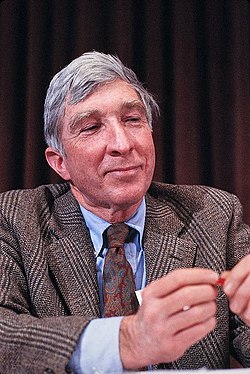John Updike Quote
Teddy was reminded of Paterson, but that polyglot population had appeared healthier, more hopeful, the American mood more fertile then in its promises, and the streets of Silk City with their little yards holding a fuchsia bush or a blue-robed plaster statue of the Virgin more livable than these stacked, stinking, ill-lit dens. He had been a part of the population then, a schoolboy immersed in its details of competition and expectation and childish collusion and hierarchy, alive in its struggle and too absorbed to judge or pity, whereas now he came upon it from outside, from above, as an agent of power and ownership, an enforcer and avenger, the representative of the system which squeezed the lowly by the same iron laws whereby it generation profits for the lucky and strong.
Teddy was reminded of Paterson, but that polyglot population had appeared healthier, more hopeful, the American mood more fertile then in its promises, and the streets of Silk City with their little yards holding a fuchsia bush or a blue-robed plaster statue of the Virgin more livable than these stacked, stinking, ill-lit dens. He had been a part of the population then, a schoolboy immersed in its details of competition and expectation and childish collusion and hierarchy, alive in its struggle and too absorbed to judge or pity, whereas now he came upon it from outside, from above, as an agent of power and ownership, an enforcer and avenger, the representative of the system which squeezed the lowly by the same iron laws whereby it generation profits for the lucky and strong.
Related Quotes
They took one look at me,And hated my black face.They took one look at me,And decided on my fate.They took one look at me,And forced an unknown fear.They took one look at me,And caused the shed of tea...
About John Updike
Hundreds of his stories, reviews, and poems appeared in The New Yorker starting in 1954. He also wrote regularly for The New York Review of Books. His most famous work is his "Rabbit" series (the novels Rabbit, Run; Rabbit Redux; Rabbit Is Rich; Rabbit at Rest; and the novella Rabbit Remembered), which chronicles the life of the middle-class everyman Harry "Rabbit" Angstrom over the course of several decades, from young adulthood to death. Both Rabbit Is Rich (1981) and Rabbit at Rest (1990) were awarded the Pulitzer Prize.
Describing his subject as "the American small town, Protestant middle class", critics recognized his careful craftsmanship, his unique prose style, and his prolific output – a book a year on average. Updike populated his fiction with characters who "frequently experience personal turmoil and must respond to crises relating to religion, family obligations, and marital infidelity".
His fiction is distinguished by its attention to the concerns, passions, and suffering of average Americans, its emphasis on Christian theology, and its preoccupation with sexuality and sensual detail. His work has attracted significant critical attention and praise, and he is widely considered one of the great American writers of his time. Updike's highly distinctive prose style features a rich, unusual, sometimes arcane vocabulary as conveyed through the eyes of "a wry, intelligent authorial voice that describes the physical world extravagantly while remaining squarely in the realist tradition". He described his style as an attempt "to give the mundane its beautiful due".
